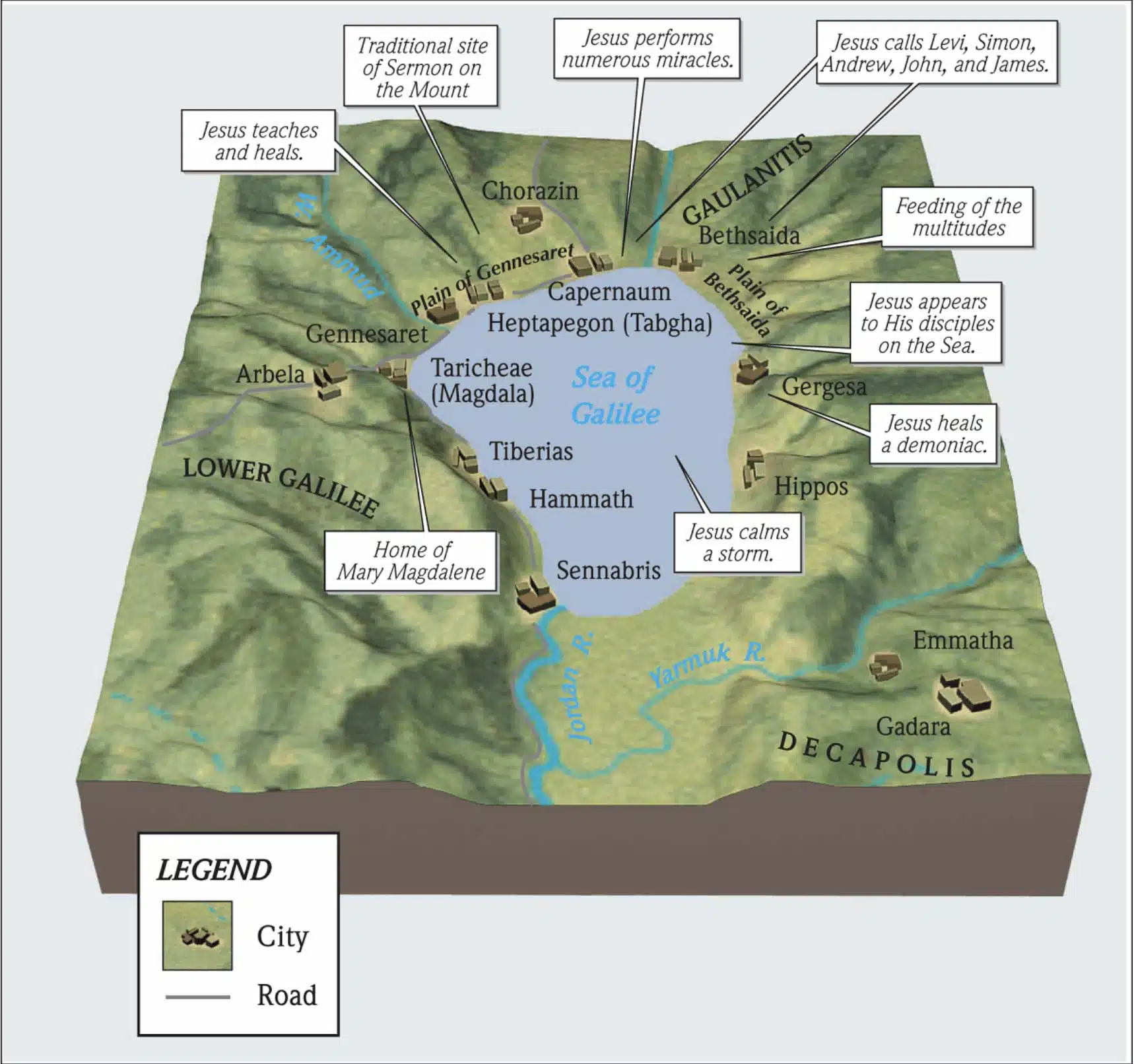Continuing His thoughts on the Day of Judgment, Jesus compares two men and their choices. The man who takes His teachings to heart is like someone who builds a house that will be able to endure the coming storm. The man who does not take His teachings to heart is like someone who builds a house that will be destroyed by the coming storm.
The parallel account of Matthew 7:24-27 is found in Luke 6:47-49.
Jesus ends his sermon proclaiming His kingdom platform to His disciples with a parable. It once again reflects the binary choice between consequences of life and death.
Therefore (in summation of all that He has been teaching) everyone (Christ’s offer is available to any and all) who hears these words of Mine (the things Jesus has been teaching) and acts on them is wise (v 24). Jesus did not say these words to make men learned. He said them to make men wise. A wise man does not simply understand truth. A wise man acts and does according to that understanding. He is what James describes as “an effectual doer”:
“One who looks intently at the perfect law, the law of liberty, and abides by it, not having become a forgetful hearer but an effectual doer, this man will be blessed (Makarios) in what he does.”
(James 1:25)
The one who hears and acts on Jesus’s words may be compared to a wise man who built his house on the rock (v 24). A house is a place of dwelling. It has personal significance and particular interest for the man who lives in it. It not only holds all of his possessions; a man’s house reflects his social station. Within Jesus’s parable, his house, signifies a man’s life and all that man holds dear.
Architectural structures were (and are) built on foundations of solid rock. Solid rock is not easily moved. It provides stability for the walls and roof of the building. Without a rocky foundation, over time the ground will shift, and the house built on it will crack, break apart, and fall. To avoid calamity, a wise man builds his house on a foundation of rock. As foundations of rock are to houses, so are the words and teachings of Jesus to everyone’s lives. If the house of our lives is built on the foundation of Jesus, the storms and trials we face will not destroy it or cause it to fall (2 Corinthians 4:7-12).
But while Jesus’s metaphor applies to the floods we face in this life, it speaks directly to the day of judgment. Jesus is continuing His thought from the preceding verses about those who will not enter the kingdom, thereby will not gain the benefits and rewards of the kingdom. The scene He depicts in this parable is an obvious allusion to God’s judgment in the days of Noah (Genesis 6:11-13, 7:17-24). And the rain fell, and the floods came, and the winds blew and slammed against that house (v 25, 27). When God judges our life (like a flood hitting a house), the only houses that will not fall are ones that have been built and founded on the rock of Jesus Christ’s words.
Jesus contrasts the house of a wise man with the house of a foolish man. The difference is not the house, so much as the foundation beneath it. This too alludes to what Christ has been saying about external works of righteousness, which are visible to all like a house’s roof and walls, and internal righteousness and integrity of the heart, which is invisible to everyone but God, like the house’s foundation. Everyone who hears these words of Mine and does not act on them, will be like a foolish man who built his house on the sand (v 26). Sand is a terrible foundation. It is always moving and is easily washed away in a flood. And when it moves it causes whatever is built on it to crack and fall. The rain fell, and the floods came, and the winds blew and slammed against that house; and it fell (v 27). Jesus adds for emphasis—and great was its fall (v 27). The fool’s house was not just damaged or lost a wing. It was no more.
Nearly every aspect of the house of the wise man and the house of the foolish man is identical. Their houses are the same, the rains that fall on them are the same, the floods that rise against them are the same, the winds that blow against them are the same. There are only two differences—their foundations and their endurance.
The only thing distinguishing the wise man and the foolish man in this life is whether or not they act on the words of Jesus. They both heard His words, but only a wise man takes them to heart and lives them with integrity. A foolish man hears Jesus’s words but does not act on them (v 26). He is like the “hearers” who James writes about, those “who delude themselves”:
“In humility receive the word implanted, which is able to save your souls. But prove yourselves doers of the word, and not merely hearers who delude themselves. For if anyone is a hearer of the word and not a doer, he is like a man who looks at his natural face in a mirror; for once he has looked at himself and gone away, he has immediately forgotten what kind of person he was.”
(James 1:21-24)
Throughout Jesus’s Sermon on the Mount, He contrasts wise living and foolish living many times.
- The wise man will have been poor in spirit, mourned, gentle, hungered for harmony with God, been merciful, pure in heart, a peacemaker, and been persecuted by the world for his righteousness. The foolish man will have been full of himself, cheerfully naïve, demanding, disgusted by God’s righteousness, judgmental, lacking integrity, a troublemaker, and persecutor of the faithful (Matthew 5:3-11).
- The wise man will not have harbored anger, lust, or dishonesty in his heart. The foolish man will have harbored anger, lust, and deceit in his heart (Matthew 5:22, Matthew 5:28, Matt 5:33-37).
- The wise man will have turned the other cheek, gone the extra mile, loved and prayed for his enemy. The foolish man will have paid back his insults, begrudged and shirked his duties, and despised those who did not love him (Matthew 5:38-47).
- The wise man will have acted righteously from the secret place of the heart to please His Father in heaven. The foolish man will have openly strutted his righteousness acts hypocritically to be seen by others (Matthew 6:1-6, Matthew 6:16-18).
- The wise man will have prayed to his Father in Heaven and asked God to forgive him as he forgives others. The foolish man will have offered empty words to God (Matthew 6:7-13).
- The wise man will have invested his treasure and heart in heaven. The foolish man will have invested his treasure and heart on earth (Matthew 6:19-20).
- The wise man will have sought God’s kingdom and His righteousness by faith. The foolish man will have spent his days worrying about his life (Matthew 6:25-33).
- The wise man will have shown mercy and forgiveness. The foolish man will have judged other people (Matthew 6:13-14; 7:1-2).
- The wise man will have treated others as he wanted to be treated. The foolish man will have lived with two standards, expecting others to treat him well, while treating others poorly (Matthew 7:12).
- The wise man will have entered by the small gate along the narrow way. The foolish man will have entered by the wide gate along the way that is broad (Matthew 7:13-14).
- The wise man will have built his house upon the rock of Jesus’s words. The foolish man will have built his house on the sands of the world (Matthew 7:24-27).
In the next life, from the Day of Judgment onward, the thing that will distinguish the wise man from the fool is their reward. Their rewards are determined by whether they acted on or did not act on the words of Jesus .
- The wise man will be granted the kingdom of heaven. The foolish man’s kingdom will have been swept away (Matthew 5:3,10).
- The wise man will receive comfort, an inheritance, satisfaction, and mercy. The foolish man will receive no such comfort, no such inheritance, no such satisfaction, and no mercy (Matthew 5:4-7).
- The wise man will see God’s face and be called His son. The foolish man will not see God’s face and be without distinction (Matthew 5:8-9).
- The wise man will be great in God’s kingdom. The foolish man will be small in God’s kingdom (Matthew 5:19).
- The wise man will be rewarded by His Father in Heaven. The foolish man’s reward will already have been received on earth and used up (Matthew 6:1, Matt 6:2, Matt 6:4, Matt 6:5, Matt 6:6, Matt 6:16, Matt 6:18).
- The wise man will have treasure and his heart in heaven. The foolish man’s treasure and heart will have rusted and been eaten by moths (Matthew 6:19-20).
- The wise man will have entered into life and its great rewards through the narrow gate. The foolish man will have entered into destruction of his opportunities in the kingdom through the wide gate (Matthew 7:13-14).
- The wise man’s house will remain standing and his work will have endured the floods and fires of Christ’s judgment. The foolish man’s house will have suffered a great fall and his work will be consumed by the floods and fires of Christ’s judgment (Matthew 7:24-27; 1 Corinthians 3:11-15).
Biblical Text
24 Therefore everyone who hears these words of Mine and acts on them, may be compared to a wise man who built his house on the rock. 25 And the rain fell, and the floods came, and the winds blew and slammed against that house; and yet it did not fall, for it had been founded on the rock. 26 Everyone who hears these words of Mine and does not act on them, will be like a foolish man who built his house on the sand. 27 The rain fell, and the floods came, and the winds blew and slammed against that house; and it fell—and great was its fall.
Check out our other commentaries:
-
Hosea 13:9-11 meaning
The LORD announces Israel’s destruction because the people turned against Him. God will destroy their military and political establishments, leaving them with no source of...... -
2 Thessalonians 3:16-18 meaning
Paul blesses his readers with words of goodwill from God, that the Thessalonians would experience His peace and favor always....... -
Matthew 17:1-8 meaning
Jesus fulfills the prophesy He told His disciples about a week earlier when He said that some of them would not see death until they...... -
Genesis 3:9-13 meaning
After Adam and Eve hide, God comes looking for them and confronts their disobedience. Now having sinned, Adam and Eve refuse to take responsibility, and...... -
Ecclesiastes 11:1-5 meaning
God determines what will be and His work is beyond our ability to control or understand. Accepting reality, the best we can do is to......




